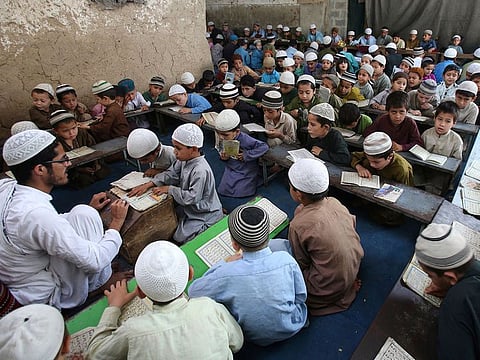Pakistan to bring religious schools into mainstream
5,000 madrassas have been registered as part of government’s reform plan

Islamabad: Pakistan has registered nearly 5,000 madrassas (religious schools) across the country as part of the government’s reform plan for the mainstreaming of more than 35,000 madrassas.
Pakistan government commenced the formal registration after the formation of the Directorate General of Religious Education (DGRE) in December 2019 to bring madrassas under the formal education structure. The directorate has 16 regional offices set up to register the seminaries.
Rafique Tahir, the head of DGRE, confirmed that 5,000 madrassas have been formally registered, and another 5,000 would be documented by the end of this year. The process of registration was going well and there was no resistance, he said.
In Pakistan, “Around three million students are enrolled in the 35,000 madaris out of which 26,160 are registered with the provincial/area governments under the society act” according to the education ministry. About 25,000 seminaries are affiliated with five organisations/boards working under the supra body of Madaris Ittehad Tanzeematul Madaris Pakistan (ITMP).
Mainstreaming the madrassas
Pakistan’s Prime Minister Imran Khan’s government is taking steps to successfully carry out the unfulfilled agenda of the previous governments to bring religious seminaries into the mainstream. The country aims to replace the three parallel education systems — public schools, private schools, and Islamic religious schools — with one uniform curriculum to create equal opportunities for all students and bridge the gap between religious and modern education.
The ministry of education announced the mainstreaming of madrassas after a series of discussions with management and representatives of religious seminaries.
The government has initially allocated Rs2 billion budget for the regulation of religious schools which would include assistance to open bank accounts, enroll foreign students, hire skilled educators and adopt the single national curriculum to improve quality of learning and offer equal opportunities to madrassa students.
Equal opportunities
Khan said that he wants the religious schools to also produce qualified students by teaching them subjects like maths, science and English, saying that the seminary students should also have opportunities to “become engineers and doctors” and that prepares from for future jobs.
“The reform agenda has bigger objectives - national uniformity, fighting intolerance and extremism, and giving fair chance to all classes of children to succeed in life” according to Dr Rasul Bakhsh Rais, author and Political Science professor at LUMS.
Challenging issue
Modernizing madrasa education is considered a challenging issue in Pakistan where religious schools are autonomous and privately funded by charities. These schools are often blamed for radicalization and there were fears of opposition when documentation began. However, Education Minister Shafqat Mahmood says reforms have been welcomed and there has been no resistance so far. Thousands of madrasa students already take board and university examinations after completing religious education.
Madrasas in Pakistan offer basic literacy to thousands of poor students in the country where more than 22 million children aged 5-16 remain out of school. Some of these religious schools also offer free accommodation and food which is an added incentive for poor families to send their children to madrassas.
Madrassa schools have been part of a noble Islamic learning tradition that encouraged both Islamic and modern scientific education. Over the years, these schools have gradually lost their significance as they restricted to conventional teaching.
Sign up for the Daily Briefing
Get the latest news and updates straight to your inbox









